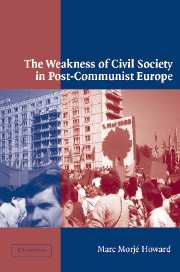Book contents
- Frontmatter
- Contents
- List of Figures
- List of Tables
- Preface
- 1 Introduction
- 2 An Experiential Approach to Societal Continuity and Change
- 3 Civil Society and Democratization
- 4 Post-Communist Civil Society in Comparative Perspective: An Empirical Baseline
- 5 Explaining Organizational Membership: An Evaluation of Alternative Hypotheses
- 6 Why Post-Communist Citizens Do Not Join Organizations: An Interpretive Analysis
- 7 Conclusion
- Appendix A Coding of the Variables
- Appendix B Country Scores on the Main Variables
- Appendix C The Post-Communist Organizational Membership Study (PCOMS) Survey
- Appendix D The In-Depth Interviews
- References
- Index
Appendix C - The Post-Communist Organizational Membership Study (PCOMS) Survey
Published online by Cambridge University Press: 05 June 2012
- Frontmatter
- Contents
- List of Figures
- List of Tables
- Preface
- 1 Introduction
- 2 An Experiential Approach to Societal Continuity and Change
- 3 Civil Society and Democratization
- 4 Post-Communist Civil Society in Comparative Perspective: An Empirical Baseline
- 5 Explaining Organizational Membership: An Evaluation of Alternative Hypotheses
- 6 Why Post-Communist Citizens Do Not Join Organizations: An Interpretive Analysis
- 7 Conclusion
- Appendix A Coding of the Variables
- Appendix B Country Scores on the Main Variables
- Appendix C The Post-Communist Organizational Membership Study (PCOMS) Survey
- Appendix D The In-Depth Interviews
- References
- Index
Summary
The Post-Communist Organizational Membership Study (PCOMS) survey was conducted in Russia and Germany in early 1999. It was financed by a grant from the National Science Foundation (grant #SBR-9810584).
In Russia, the survey was carried out by the All-Russian Center for the Study of Public Opinion (VTsIOM), between January 10 and February 8, 1999, as part of its bimonthly “omnibus.” The universe was the population of the European part of the Russian Federation (including the Urals region) aged 16 years and over, and the sample was representative by gender, age, educational level, region, and urban and rural residence. Overall, the sample consisted of 1,009 interviews taken in approximately 80 urban settlements and rural regions of the European part of Russia. Given the low levels of phone penetration in Russia, all of the interviews were face-to-face, as is common for Russian survey research.
In Germany, the survey was conducted by the Institute for Social Research and Analysis (FORSA), from January 25 to February 11, 1999. The universe was the population of both Western and Eastern Germany aged 28 years or older, and both samples were representative by gender, age, educational level, region, and urban and rural residence. The sample consisted of 1,003 interviews in Eastern Germany, and 1,008 in Western Germany. The interviews were all conducted by telephone, using computer-assisted techniques.
Table C.1 presents the overall distribution of the three samples, in terms of gender, age, and education.
- Type
- Chapter
- Information
- The Weakness of Civil Society in Post-Communist Europe , pp. 170 - 174Publisher: Cambridge University PressPrint publication year: 2003



